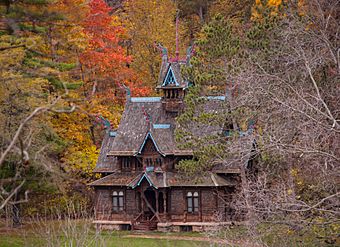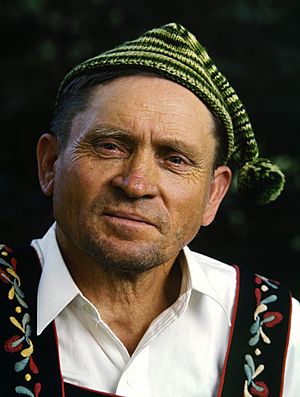Little Norway, Wisconsin facts for kids
Quick facts for kids |
|
|
Little Norway
|
|

The Norway Building built in Norway for Chicago's Columbian Exposition.
|
|
| Location | 3576 CTH JG, Blue Mounds, Wisconsin |
|---|---|
| Area | 53 acres (21 ha) |
| Built | 1927 |
| Architect | Hansteen, Albert Waldemar; Nerdrum, Stanley |
| Architectural style | Modern Movement |
| NRHP reference No. | 98000169 |
| Added to NRHP | March 16, 1998 |
Little Norway was a special place in Blue Mounds, Wisconsin, that looked like a small Norwegian village. It was like a living museum, showing what a Norwegian farm from the mid-1800s was like. This unique spot is even listed on the National Register of Historic Places because of its importance.
Little Norway closed its doors in late 2012.
The Story of Little Norway
Little Norway started with a man named Osten Olson Haugen. He was an immigrant from Telemark, Norway. In the 1850s, Mr. Haugen settled on 40 acres of land. He built his home and other farm buildings using timber from his own property. His family farmed this land until 1920.
In the early 1930s, a businessman from Chicago named Isak Dahle had an idea. He had just visited Norway and remembered his childhood in Wisconsin. He wanted to create a Norwegian farm as a gift for his family. He called it Little Norway. He also gave it a Norwegian name, Nissedahle, which was a clever play on words. Sadly, Dahle passed away in 1937.
After Dahle's death, his relative, Asher Hobson, took over the property. Asher Hobson was a professor at the University of Wisconsin. Later, his daughter Marcelaine Winner and then his grandson Scott Winner managed Little Norway. After World War II, the owners offered to sell the property to the State of Wisconsin for just $1. However, the state did not want to pay for the upkeep.
Little Norway closed in late 2012. The owner, Scott Winner, explained that the costs of running it were higher than the money it made. Since then, he has sold parts of the collection to museums and private collectors. He has also talked with the Wisconsin Historical Society about buying the property.
The Famous Norway Building
One of the most famous parts of Little Norway was the Norway Building. This amazing building was first built in Orkdal, Norway. It was made for the Norway Pavilion at Chicago's 1893 World's Columbian Exposition, a big world's fair. It was a rare example of Norse stave church style architecture outside of Norway.
After the Chicago World's Fair ended, the Norway Building was sold. A businessman named C.K.G. Billings bought it. He moved it by train to his vacation home in Lake Geneva, Wisconsin. Over the years, it had several owners and was used for fun activities. The Wrigley family even used it as a private theater.
During the Great Depression, the Norway Building started to fall apart. Isak Dahle, the founder of Little Norway, bought it in 1935. He moved it to Little Norway and restored it.
After Little Norway closed in 2012, people from Orkdal Municipality, Norway, wanted to bring the building home. They raised $700,000 from the Norwegian government and private donations. In 2015, experts carefully took the building apart. It was then shipped across the ocean and put back together in Norway. The reassembled building was officially opened on September 9, 2017. A Norwegian group also dedicated an Illinois State Historical Plaque in Jackson Park in Chicago on August 25, 2018. This plaque marks where the original building stood in 1893.
Other Cool Spots at Little Norway
Little Norway had many other interesting buildings that showed what life was like long ago:
- Stabbur – This was a special food storage building. It was built on tall wooden posts to keep food safe from animals.
- Sod-roofed cabin – This cabin had a roof covered with grass and plants. It was built into a hillside, which allowed goats to climb up and graze on its roof!
- Main cabin – This building was once home to farm animals like cattle and sheep.
- Spring house – This small building protected a natural spring. Pure, fresh water flowed through it.
- Stue – This was the main family home where people lived.
- Bachelor's cabin – This cabin was first used for weaving and spinning wool. Later, it became a home for Osten Haugen's brother-in-law.
- Laden – This building started as a tool room. It was later turned into a cozy cabin with old-fashioned wooden roof shingles.
 | William L. Dawson |
 | W. E. B. Du Bois |
 | Harry Belafonte |




